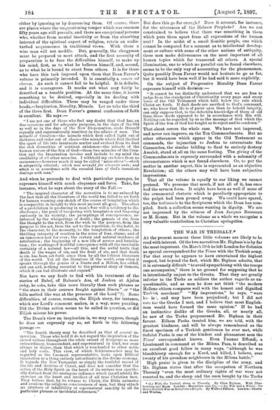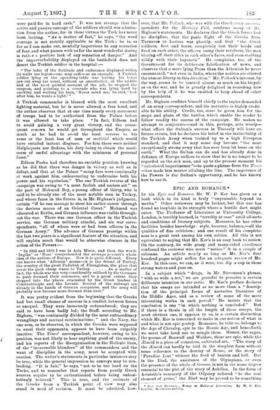THE WAR IN THESSILY. 0 AT the present moment these little
volumes are likely to be read with interest. Of the two narratives Mr. Bigham's is by far the most important. On March 19th he left London for Salonica as special correspondent for the Times with the Turkish army. For that army he appears to have entertained the highest respect, but beyond the fact, which Mr. Bigham admits, that it is extremely difficult "to avoid sympathising with the troops one accompanies," there is no ground for supposing that he is intentionally unjust to the Greeks. That they are greatly inferior to the Turks as soldiers the author regards as un- questionable, and as men he does not think "the modern Helene citizen compares well with the honest and dignified Turkic:1i merchant." "My impressions," he says, "were hu, ie ' , and may have been prejudiced ; but I did not care for the Greeks I met, and I believe that most English- men would have formed the same opinion." If he had an instinctive dislike of the Greeks, all, or nearly all, he saw of the Turks prepossessed Mr. Bigham in their favour. Edhem Pasha treated him, we are told, with the greatest kindness, and will be always remembered as the finest specimen of a Turkish gentleman be ever met, while Sefulat Pasha is one of the kindest and pleasantest men the Times' correspondent knows. Even Yunnaz Effendi, a Lieutenant in command at the Milona Pass, is described as an excellent good fellow in many ways, "although he was bloodthirsty enough for a Kurd, and killed, I believe, over twenty of his quondam neighbours in the Milona battle."
High praise is given to the discipline of the army, and Mr. Bigham states that after the occupation of Northern Thessaly "even the most ordinary rights of war were not resorted to, and the sheep and the oxen bought by the Turks
• (I.) With the Turkish Army in Thessaly. By Clive Bigham. With Illus- trations and Maps. London : Macmillan and 00.--;2j War and a Wheel the Grace-Turkish War as Seenfrom a Bicycle. By Wilfred Pollock. London : Matto and Windas.
were paid for in hard cash." It was not strange that the active and passive courage of the soldiers should win admira- tion from the author, for in these virtues the Turk has never been lacking. "As a matter of fact," he says, "the word courage is not strictly applicable to the Turk ; he is, as far as I can make out, mentally impervious to any sensation of fear, and what passes with us for the most wonderful daring is ratl:ur a positive lack of any sensation of danger." And the imperturbability displayed on the battlefield does not desert the Turkish soldier in the hospital :—
" The tales of the fortitude and endurance displayed within its walls are legion—one may suffice as an example. A Turkish soldier lying on the operating-table was having his lower jaw cut away (as usual, without an antesthetic); in the middle and at the most painful moment of the job, he stopped the surgeon, and pointing to a comrade who was lying hard by smoking and waiting his turn, 'Never mind me,' he said, 'look after him, he wants a light.'"
A Turkish commander is blessed with the most excellent fighting material, but he is never allowed a free hand, and the author observes that at one time nearly every movement of troops had to be authorised from the Palace before it was allowed to take place. "In fact, Edhem had to avoid gaining a very great victory, and the conse- quent renown he would get throughout the Empire, as much as he had to avoid the least reverse to his arms or the least loss of men or materiel which would have entailed instant disgrace. For him there were neither Malplaquete nor Sedans, his duty being to obtain the maxi- mum of useful advantage with the minimum of personal fame."
Edhem Pasha had therefore no enviable position, knowing as he did that there was danger in victory as well as in defeat, and that at the Palace "many foes were continually at work against him, endeavouring to undermine both his power and his reputation." The one Turkish reverse of the campaign was owing to "a most foolish and useless act" on the part of Mahmud Bey, a young officer of thirty, who is said to be already one of the most notable men in Turkey, and whose fame in the future is, in Mr. Bighorn's judgment, certain "if he can manage to steer his earlier career through the devious mazes of an Oriental Court." Mahmud was educated at Berlin, and German influence was visible through- out the war. There was one German officer in the Turkish service, one German military attaché, and six war corre- spondents, "all of whom were or had been officers in the German Army." The advance of German prestige within the last two years is a significant feature of the situation, and will explain much that would be otherwise obscure in the action of the Powers :—
" In 1895 and 1896 I was in Asia Minor, and then the words or ' Russ ' comprehended the average peasant's whole idea of the nations of Europe. Now it is quite different. Every one knows what 'Anemia ' means—it is the friend of Turkey, the vountry of the great Padishah of Firengistan, the place that
se:. as the good cheap wares to Turkey As a matter of fact, the whole war was very considerably utilised by the Germans to push forward their commerce, and to a great extent they stepped into the places evacuated by the Greek traders in Constantinople and the Levant. Several of the railways are already in the hands of German companies, and the army will probably now become more German than ever."
It was pretty evident from the beginning that the Greeks had but small chance of success in a conflict between forces so unequal. They were immensely outnumbered; they are said to have been badly led; the Staff, according to Mr. Bigharn, "was continually divided by the most extraordinary wranglings and mutual recriminations ; " and the Navy, the one arm, as he observes, in which the Greeks were supposed to excel their opponents, appears to have been culpably inactive. The Times' correspondent, however, owing to his position, was not likely to hear anything good of the enemy, and his reports of the disorganisation in the Hellenic lines, of the "inexcusable blunders" of the commanders and the want of discipline in the army, must be accepted with caution. The writer's statements in particular instances may be true, while the general impression he conveys may be mis- leading. "It is fair," he says, "not to be too hard on the Turks, and to remember that reports from purely Greek sources require to be authenticated before being unhesi- tatingly believed." This is true, and the estimate of the Greeks from a Turkish point of view may also stand in need of revision. It must be admitted, how-
ever, that Mr. Pollock, who was with the Greek army as corre- spondent for the Morning Post, confirms many of Mr. Bigham's statements. He declares that the Greek forces had no discipline, that the panic flight of the Greeks from Turnavos to Larissa was ghastly, and that "the Greek soldiers, foot and horse, completely lost their heads and fired on each other, the officers using their revolvers, the men blazing off their rifles in each other's faces, and even stabbing wildly with their bayonets." He complains, too, of the Government for its deliberate falsification of news, and observes that a more lying Press than the Athenian he never encountered, "not even in India, where the natives are allowed the utmost liberty in this direction." Mr. Pollock's interest, by the way, seems to be centred almost as much on his bicycle as on the war, and he is greatly delighted in recording how by the help of it he was enabled to keep ahead of other correspondents.
Mr. Bigham confines himself chiefly to the topics demanded of an army correspondent, and his narrative is highly credit- able to his ability. Credit, too, must be given him for the maps and plans of the battles, which enable the reader to follow readily the course of the campaign. He makes no attempt to conjecture—and in this, perhaps, acts wisely— what effect the Sultan's success in Thessaly will have on future events, but he declares his belief in the invincibility of the Turkish Army when trained up to a high European standard, and that it may some day become "the most exceptionally strong army that has ever been let loose on the earth." What the Sultan can do and has already done in defiance of Europe suffices to show that he is no longer to be regarded as the sick man, and up to the present moment his "calculated impertinence "—to quote a phrase from the Times —has made him master all along the line. The impotence of the Powers is the Sultan's opportunity, and he has known bow to use it.



































 Previous page
Previous page